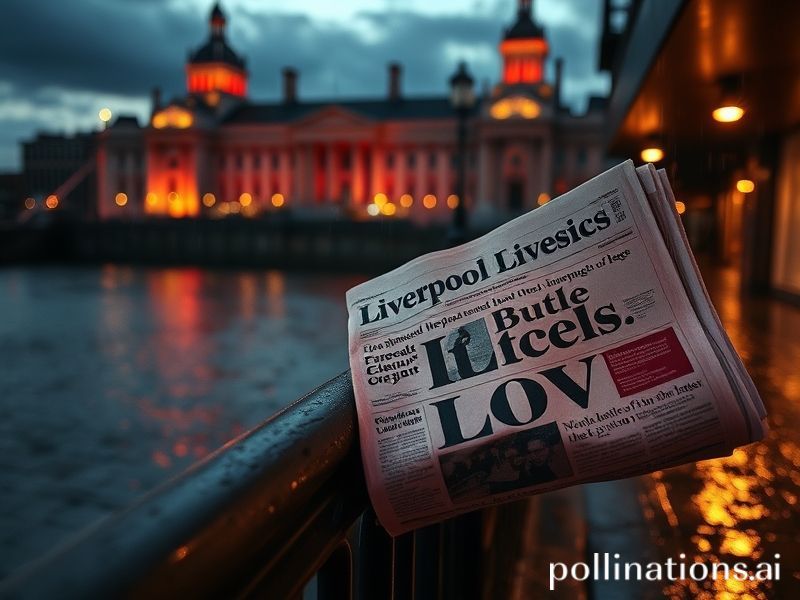Liverpool Echo: How a Merseyside Paper Became the World’s Canary in the Clickbait Coal Mine
From the banks of the Mersey to the megacities of the Pacific Rim, the phrase “Liverpool Echo” is no longer just the local paper your nan clips coupons from; it has become a cultural sonar ping that bounces off every corner of late-stage capitalism. To outsiders it is, at first glance, a provincial rag: shouty headlines about footballers’ haircuts, court cases involving men nicknamed “Scouse Tony,” and the perennial debate on whether a new £42 million ferry terminal counts as progress or penance. Yet zoom out—way out—and the Echo starts to resemble a weather balloon sent up by the entire Western world, measuring how much hot air the rest of us can still expel before the atmosphere files for bankruptcy.
Let’s begin with the obvious: circulation. The print run is now roughly equivalent to the population of Liechtenstein on a particularly optimistic day, but the website pulls in global traffic spikes any time Mohamed Salah sneezes near a goalpost. Data analysts in Singapore hedge funds monitor these surges like commodity futures, because they know that whatever Liverpudlians are furious about at 9 a.m. GMT is what half of Twitter will be furious about by happy hour in California. In other words, the Echo has become an early-warning system for moral outrage—think of it as a seismograph for the tectonic plates of public mood, only with more exclamation marks.
Meanwhile, the Chinese media conglomerate that quietly bought a minority stake last year (the one registered above a vape shop in the Caymans) sees the paper as a laboratory for “emotional engagement metrics.” Apparently, nothing tests the elasticity of human credulity quite like a headline that screams “I BOUGHT A £1 HOUSE AND NOW I’M TRAPPED IN A NIGHTMARE” next to a pop-up advert for discounted patio heaters. The experiment is simple: can you make people click on tragedy, then upsell them garden furniture? Early results suggest humanity is flunking with flying colours.
Then there’s the diplomatic angle. When the Echo ran an April Fool’s joke claiming Everton would relocate to South Sudan for tax reasons, the South Sudanese embassy in London issued a polite clarification that they already have “adequate sporting heartbreak of their own.” The episode was retweeted by the French consulate with the single word “Incroyable,” which is diplomacy-speak for “We surrender to the absurd.” Thus a back-page prank became soft-power ping-pong, proving that in the 21st century even regional sarcasm can spark a minor consular incident.
One must also consider the environmental footprint. Each year the paper recycles enough unsold copies to build a papier-mâché replica of the Liver Building, which would actually be sturdier than the current one. Climate scientists in Bonn quietly applaud this circular economy, though they note that the carbon saved is roughly offset by the coal-powered rage generated in the comments section whenever someone suggests cyclists deserve rights. Net-zero remains elusive, but at least the planet is dying with better-informed readers.
And what of the future? The newsroom has started experimenting with AI-generated match reports that replace clichés with fresh horrors (“Alexander-Arnold’s cross arced like the trajectory of Western liberal democracy”), while simultaneously laying off sub-editors whose only crime was knowing the difference between “relegated” and “regulated.” It’s a bold strategy: outsource language to machines and hope the machines develop a sense of irony before the readers notice. So far, the algorithm’s grasp of Scouse sarcasm is on par with a Texan tourist ordering chips and getting crisps—close, but not quite tragicomic enough.
In conclusion, the Liverpool Echo is both less and more than a local newspaper. Less, because its physical presence dwindles faster than Britain’s diplomatic clout; more, because its digital reverberations shape memes, markets, and minor geopolitical spats from Lagos to Los Angeles. It stands as a monument to the idea that if you shout loud enough about bins not being collected, someone in a co-working space in Mumbai will eventually build an app to track your rubbish. And that, dear reader, is the true global takeaway: in the age of infinite content, even the smallest provincial echo can ricochet around the world—just don’t expect it to make sense when it comes back.







